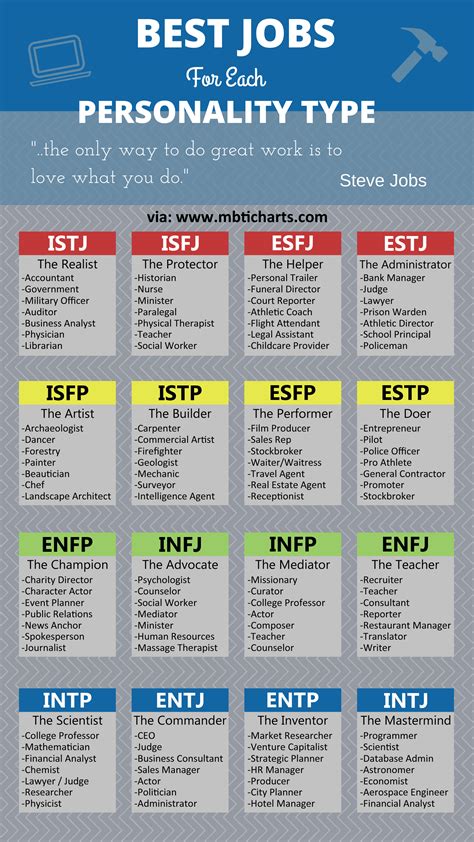Myers-Briggs Personality Types & Job Compatibility

Have you ever wondered why certain people excel in certain jobs while others struggle? One possible explanation lies in their personality types. The Myers-Briggs Type Indicator (MBTI) is a widely used psychological tool that can help individuals understand their personality preferences. By understanding your own personality type, you can gain insights into which jobs may be the best fit for you. In this article, we will explore the different Myers-Briggs personality types and their compatibility with various careers.
1. The Introverted (I) vs. Extraverted (E) Dichotomy
The first dimension of the MBTI measures whether individuals are introverted or extraverted. Introverts tend to be more reflective and prefer solitude, while extraverts thrive in social situations and enjoy being around others.
Introverted Personality Types:
- ISTJ (Introverted, Sensing, Thinking, Judging)
- ISFJ (Introverted, Sensing, Feeling, Judging)
- INFJ (Introverted, Intuitive, Feeling, Judging)
- INTJ (Introverted, Intuitive, Thinking, Judging)
Extraverted Personality Types:
- ESTJ (Extraverted, Sensing, Thinking, Judging)
- ESFJ (Extraverted, Sensing, Feeling, Judging)
- ENFJ (Extraverted, Intuitive, Feeling, Judging)
- ENTJ (Extraverted, Intuitive, Thinking, Judging)
2. The Sensing (S) vs. Intuition (N) Dichotomy
The second dimension of the MBTI measures whether individuals rely more on their five senses or their intuition when processing information. Sensing types prefer concrete facts and details, while intuitive types are more focused on patterns and possibilities.
Sensing Personality Types:
- ISTJ
- ISFJ
- ESTJ
- ESFJ
Intuitive Personality Types:
- INFJ
- INTJ
- ENFJ
- ENTJ
3. The Thinking (T) vs. Feeling (F) Dichotomy
The third dimension of the MBTI measures how individuals make decisions. Thinking types tend to prioritize logic and objectivity, while feeling types consider personal values and emotions.
Thinking Personality Types:
- ISTJ
- INTJ
- ESTJ
- ENTJ
Feeling Personality Types:
- ISFJ
- INFJ
- ESFJ
- ENFJ
4. The Judging (J) vs. Perceiving (P) Dichotomy
The fourth dimension of the MBTI measures how individuals approach the outside world. Judging types prefer structure and organization, while perceiving types are more adaptable and spontaneous.
Judging Personality Types:
- ISTJ
- ISFJ
- INFJ
- INTJ
Perceiving Personality Types:
- ESTJ
- ESFJ
- ENFJ
- ENTJ
5. Job Compatibility Based on Personality Types
Now that we have a basic understanding of the different Myers-Briggs personality types, let’s explore their compatibility with various careers:
ISTJ – The Inspector
ISTJs are practical, detail-oriented, and organized individuals. They excel in careers that require precision and attention to detail, such as accounting, engineering, and law enforcement. Famous ISTJs include Michelle Obama and George Washington.
ISFJ – The Protector
ISFJs are loyal, responsible, and compassionate individuals. They thrive in careers that involve helping others, such as nursing, teaching, and social work. Famous ISFJs include Mother Teresa and Queen Elizabeth II.
INFJ – The Counselor
INFJs are insightful, empathetic, and idealistic individuals. They are well-suited for careers in counseling, psychology, and social justice advocacy. Famous INFJs include Nelson Mandela and Martin Luther King Jr.
INTJ – The Mastermind
INTJs are strategic, independent, and logical individuals. They excel in careers that require complex problem-solving and long-term planning, such as architecture, computer programming, and entrepreneurship. Famous INTJs include Elon Musk and Isaac Newton.
ESTJ – The Supervisor
ESTJs are practical, assertive, and organized individuals. They thrive in careers that involve managing people and resources, such as project management, sales, and corporate leadership. Famous ESTJs include Angela Merkel and Judge Judy.
ESFJ – The Provider
ESFJs are warm, sociable, and caring individuals. They excel in careers that involve working with people, such as healthcare, customer service, and event planning. Famous ESFJs include Oprah Winfrey and Taylor Swift.
ENFJ – The Teacher
ENFJs are charismatic, empathetic, and inspiring individuals. They are well-suited for careers in teaching, counseling, and public speaking. Famous ENFJs include Barack Obama and Oprah Winfrey.
ENTJ – The Commander
ENTJs are confident, assertive, and strategic individuals. They thrive in careers that involve leadership and innovation, such as business management, entrepreneurship, and politics. Famous ENTJs include Steve Jobs and Margaret Thatcher.
Conclusion
The Myers-Briggs Type Indicator is a powerful tool that can provide valuable insights into an individual’s personality preferences. By understanding your own personality type, you can make more informed decisions about your career path. Remember, these are just general guidelines, and individual preferences and strengths may vary. It’s important to consider other factors, such as skills, interests, and values, when choosing a career.
Frequently Asked Questions
1. Can my personality type change over time?
No, your basic personality type does not change. However, individuals can develop and mature, which may lead to changes in behavior and preferences.
2. Can I have traits from multiple personality types?
Yes, it’s possible to have traits from multiple personality types. Some individuals may fall close to the middle of two or more dimensions.
3. Can I use the MBTI to determine which career is best for me?
The MBTI can provide insights into your personality preferences and how they may align with certain careers. However, it’s important to consider other factors, such as skills, interests, and values, when making career decisions.
4. Are certain personality types more successful than others?
Success is subjective and can vary greatly depending on individual goals and definitions of success. Each personality type has its own unique strengths and weaknesses that can contribute to success in different areas.
5. Can I take the MBTI assessment online?
Yes, there are many online platforms that offer the MBTI assessment. However, it’s important to choose a reputable source to ensure accurate results.

